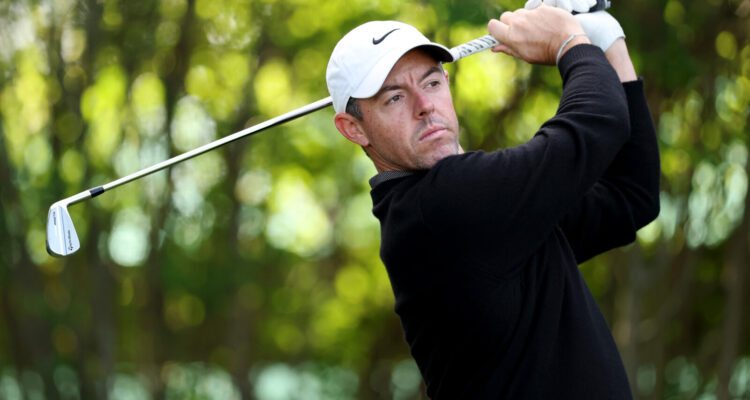Rory, you’re a four-time winner of the Truist Championship, but at Quail Hollow Golf Club, and this year we’re at the Philadelphia Cricket Club. Can you open up with some thoughts about defending at this historic course?
RORY MCILROY: Yeah, the last two times I’ve won the Truist Championship, I haven’t been able to defend on the same golf course the next year. We won in ’21 and then played Potomac, and won last year and then we’re here.
So it doesn’t quite feel like a defense, but it’s good to be here. It’s always at this stage of my career, it’s cool to come to new venues, see new golf courses, and do new things.
It’s been nice to play this golf course. I’ve heard a lot about this golf course, and to play it over the last couple days has been cool. I’m trying to learn a little bit about it and trying to come up with a strategy to play it.
Yeah, good to be here. First week, I guess, as an individual coming back and playing over the last few weeks. I’m excited to get back to being a golfer. It’s nice to get back into the routine again and get back to what I know how to do.
Q. You had a chance to play nine holes this morning. Can you just share a little bit more about maybe what’s standing out to you at this golf course?
RORY MCILROY: I played the back nine yesterday. I played the front nine today. It’s very similar to a lot of these old school courses that have been renovated over the past few years. A lot of trees have been taken out. The green complexes are, for me, the interesting thing about the golf course.
It sort of to me feels like a smaller version of Oak Hill, not a lot of strategy off the tee because there’s no real hazards. There’s some fairway bunkers, but if you avoid those, the rough’s not that long so it’s not a huge penalty.
A little simple off the tee, I guess, is the best way to describe it, but making sure with the second shots that you’re below the hole and trying to get to learn the greens a little bit more. Yeah, sort of a smaller, shorter version of Oak Hill is sort of how I see the course.
Q. Have you ever played much cricket?
RORY MCILROY: I played a little bit.
Q. Bat or bowl?
RORY MCILROY: A bit of both actually. I played a little bit at my — at Sullivan, which is the school I went to. Yeah, I was — I actually preferred bowling than batting. I never really wanted to get hit by the ball.
Q. You just implied there in your opening that you have your business hat back on. Are you keen after all the celebrating to kick back in now?
RORY MCILROY: Yeah, I don’t even think that — it’s not the — it’s not even the celebrating, it’s almost like the obligations that you have afterwards.
I wanted to go home and see my folks after, and then that was nice. But then having to play straight after in New Orleans, which is a different week and a fun week and I didn’t feel like I really had to prepare all that much. I could lean on Shane a little bit when I needed to.
But especially last week, I had Michael Bannon in town. We practiced for three days — Monday, Tuesday, Wednesday — but then I was up in New York for three days doing a few bits and pieces. So when I got back home and sort of got back more into my real routine Sunday, Monday, coming up here, it feels more — you know, that period is sort of behind me, and I’m looking forward to the next few months.
Q. You said it’s nice at this stage of your career to come to a new course, a new place. You talked a little bit about it just now, but what kind of stands out to you both on the course, on the area? And what’s the importance for the TOUR to come to new places?
RORY MCILROY: Look, Philadelphia is one of the best places in the U.S. for golf. There’s so many great courses around here. We’ve got — we’re playing the PGA at Aronimink next year. We’re playing the U.S. Open in ’30 at Merion. There’s a lot of great golf in this area.
It’s a beautiful spot. I feel like we don’t play enough tournaments in the Northeast, but a lot of the Northeast golf clubs are smaller venues like this, and just with how big these tournaments have become over the years, it’s very hard for a golf course like this to hold a big tournament. The logistical problems that that causes is the main issue.
As a golf course, it’s — look, I — it’s an older course that’s been renovated, and I think they’ve done a really good job with it. It’s just it was renovated, I don’t know, ten or I don’t know how many years ago, but it’s not like a brand new renovation.
I think, when it was renovated, it probably would have held up to the distances that were being hit, but even now ten years on, I feel like every par-4 out there is like 430, 440. They sort of feel like they’re 40 or 50 yards than what they need to be. Still, it’s a cool track to play.
Q. Literally around the world millions of people are wondering is this guy ever going to win the Masters? There was so much emotion vested in it. In your own mind, did you always have faith you would win it?
RORY MCILROY: I always had hope. It’s not as if I — I wasn’t going to show up at Augusta and feel like I couldn’t win. The week that I feel like that, I’ll go up there for the Champions Dinner and swan around in my green jacket, but I won’t be playing.
Yeah, I always had hope. I always felt like I had the game. And like I think, as everyone saw on that back nine on Sunday, it was about getting over — I don’t know what the right phrase is, but defeating my own mind was sort of the big thing for me and getting over that hurdle.
Look, I’m just glad that it’s done. I don’t want to ever have to go back to that Sunday afternoon again. I’m glad that I finished the way I did, and we can all move on with our lives.
Q. Did you always imagine the idea of putting on that green coat? Was that clear in your mind?
RORY MCILROY: No, that wasn’t really — to me, whenever I think about these things, I think about the golf. I think about the golf. I think about the sense of satisfaction of winning the tournaments.
No, I never imagined the Butler Cabin ceremony. I never imagined all the things. I imagined hitting the shots I needed to hit to win the golf tournament.
Q. Rory, you were talking a couple weeks ago how you wanted a club that carried 300 yards to be short of some necks in fairways. Is this a golf course that you’re still looking for that club, or is this a golf course where it’s going to be open season, hit driver everywhere?
RORY MCILROY: Yeah, you can send it. Every bunker seems to be about 300 to 310 to carry, which is thankfully fine. There’s one bunker on 9 that’s 331, but it’s down like 10, so it’s like 320 equivalent. That’s the longest one to try to get over. In good conditions I can, if it’s calm or a little bit of help.
Yeah, it’s basically open season. The way — I go back to Oak Hill a couple years ago at the PGA, and I tried to play the golf course strategically over the first couple of days, and I just realized that these new renovated old school courses, like the strategy is just hit driver everywhere and then figure it out from there. That’s sort of the strategy of this place this week.
Q. Is that still a club you’re looking for for the rest of the summer?
RORY MCILROY: For certain courses, I think it is, but I’ve always been apprehensive to just put a club in for a certain week. I like to get used to clubs. I know the characteristics of my 3-wood. I’ve been using that for over a year. Then I know the characteristics of my 5-wood. I know that, if anything, I’ll miss my 3-wood a little bit to the right, and if anything, I’ll miss my 5-wood a little bit to the left.
Every club has its own personality, and I think it takes time to learn what that personality is. So I’m pretty averse to changing a lot.
Q. Can you talk a little bit about the week going home after the Masters? What did you do? How was that experience? Did it help you recharge? I think Poppy might have been with you. How was that?
RORY MCILROY: Yeah, we all went over as a family — Poppy, Erica, and I — firstly to London to see our new house there that we’ve been building for the last couple years. So that was fun to see that. Then we spent the weekend in Northern Ireland. I wanted to see my folks and sort of my immediate family and Michael Bannon as well.
We did that. Look, it was amazing going home. I didn’t want any fanfare. I didn’t want to — I tried to keep it as private as possible. I just wanted to see my parents and the people that were closest to me, and we had a really nice two days.
With my dad, like I never get that emotional with my dad. It was great. It was great to see him. Then when I saw my mom, I — yeah, we were both a mess for a few minutes.
Look, as an only child, I have a bond. I’m lucky, and I know a lot of people feel this, that they have a close bond with their parents, but I think as time goes on and I’m getting a little older, I realize that they’re not going to be around forever. It means even more that they were still around to be able to see me complete the slam and fulfill those dreams.
Q. Having just lived that yourself, how much does that weigh into what you’re thinking about versus just trying to win another major championship and let the grand slam be a by-product?
RORY MCILROY: It’s hard, I think, for Jordan having to do — you have to go back to the same tournament every year for Jordan, but not the same golf course. I think it’s a little bit of a different — it’s a bit of a different proposition for him rather than me having to go back to the same venue every year and trying to, I guess, do that as well.
As much as you try to get yourself in the right frame of mind to just try to win the golf tournament and then let everything else happen, it’s in there. Consciously or subconsciously, you feel that.
I said this to people, the worst I felt on Sunday at Augusta was probably when I held the birdie putt on 10 to go 4 ahead because I’m like, oh, I really can’t mess this up now. There’s that pressure.
You know that you’re not just trying to win another tournament, you’re trying to become part of history, and that has a certain weight to it. I’ve certainly felt that at Augusta over the years. I’m sure Jordan has felt that a bit going into each PGA that he’s had a chance to do the same thing.
Q. You mentioned things getting back to normal, but next week you’re going to arrive at a major for the first time in ten years without questions of the drought hanging over you. I’m curious, as things have settled and you approach the major, how do you feel differently now that that question’s no longer there?
RORY MCILROY: I think there’s a few things. I’m obviously going to feel more comfortable and a lot less pressure, and I’m also going back to a venue that I love. It’s nothing but positive vibes going in there next week with what happened a few weeks ago and then with my history there and how well I’ve played at Quail.
Yeah, it probably will feel a little bit different. I probably won’t be quite as on edge as I have been for the last few years when I’ve been at major championships. I’ll probably be a little bit better to be around for my family, and I’ll be a little more relaxed. I think overall it will be a good thing.



